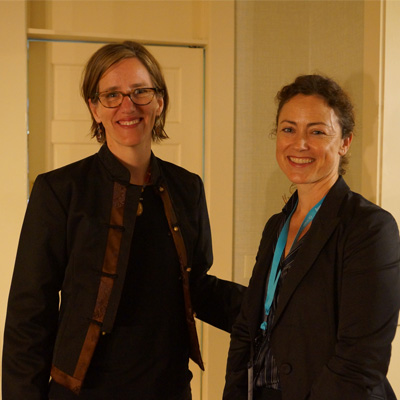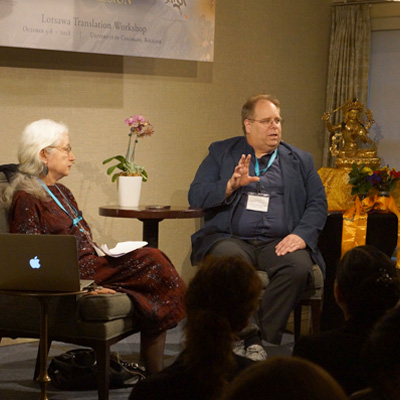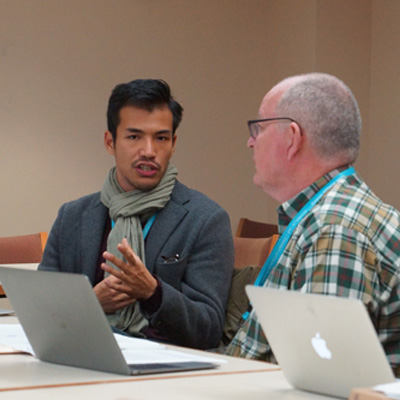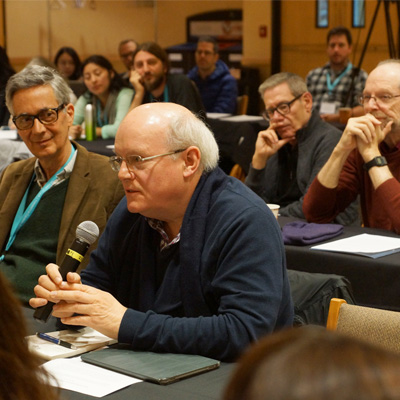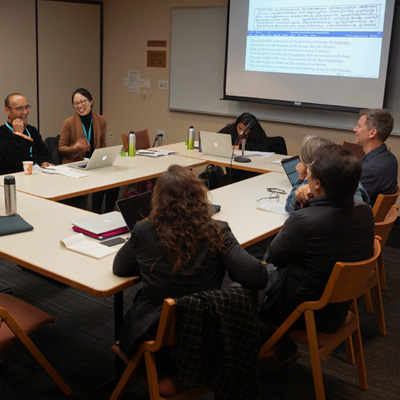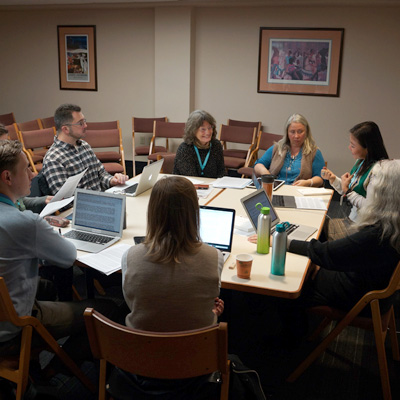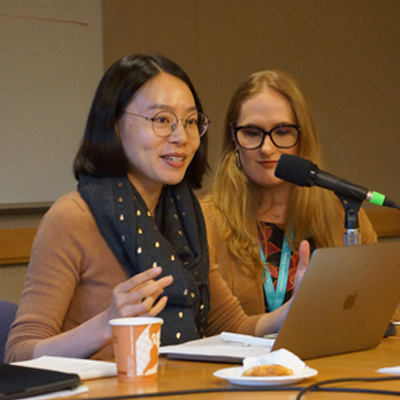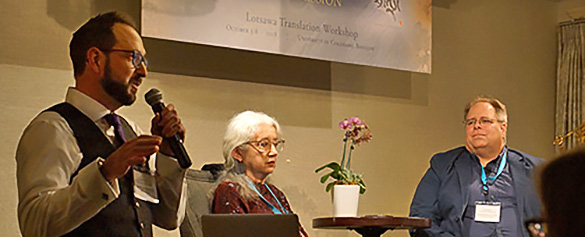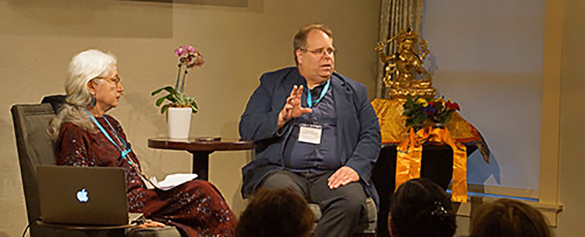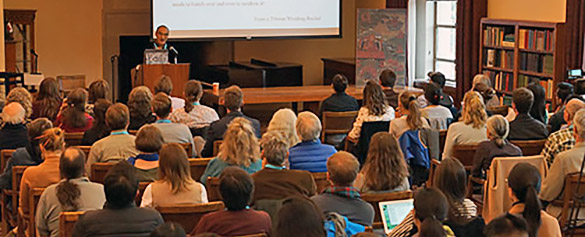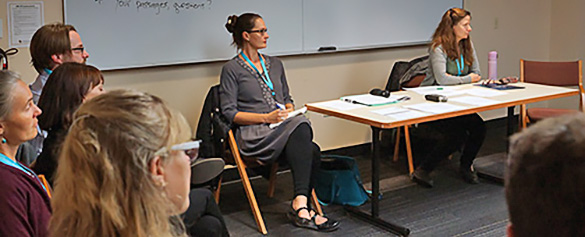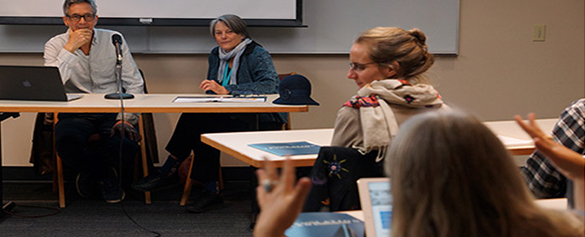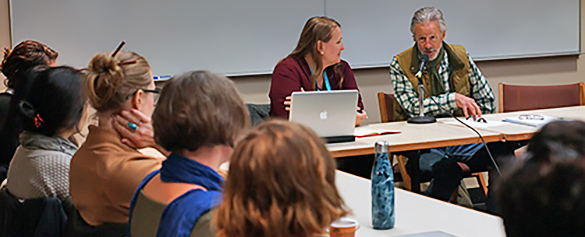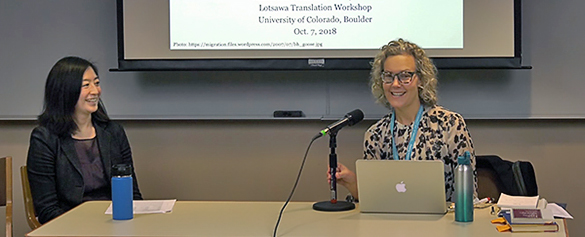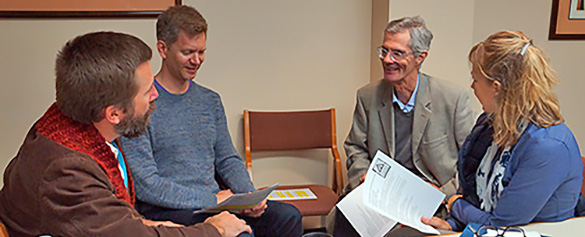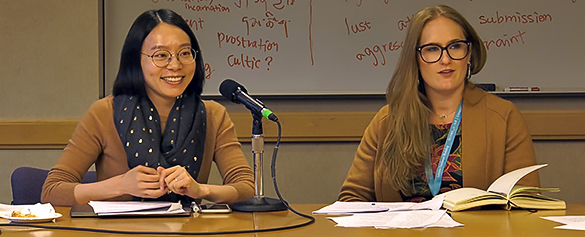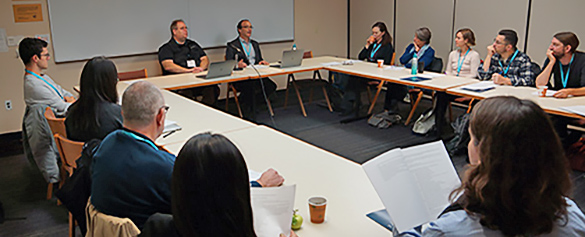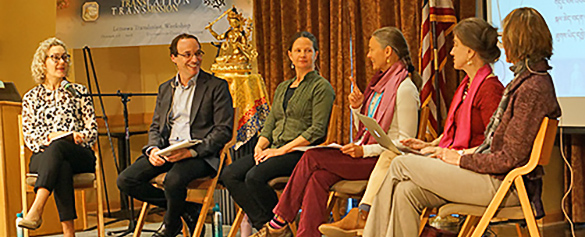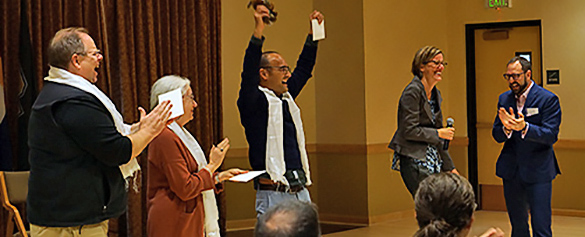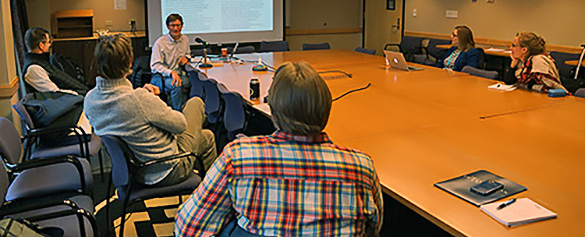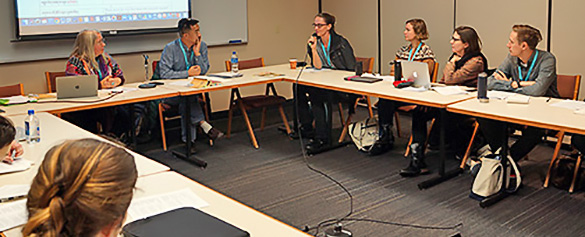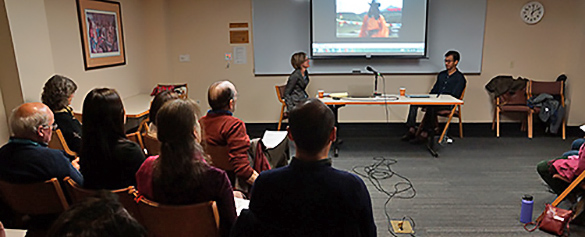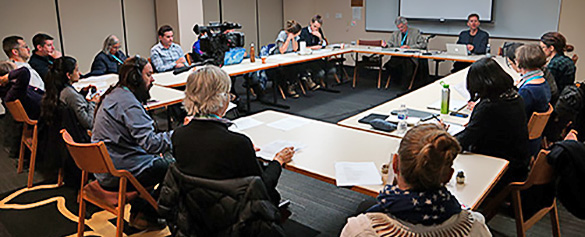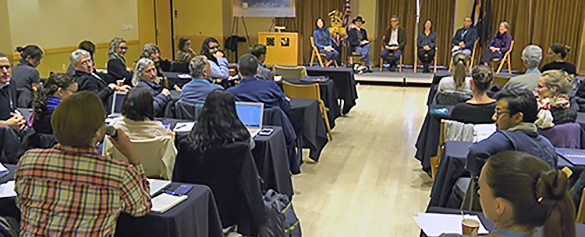New Update: Audio recordings only available here
The Lotsawa Translation Workshop, held at the University of Colorado Boulder on October 5-8, 2018, created an opportunity to nurture a community of practice around the translation of Tibetan Buddhist texts. The thematic focus of the workshop was “Tibetan songs (mgur) and affect in a Buddhist devotional framework”.
Workshop Format
Modeled on the Bread Loaf Translators’ Conference at Middlebury College, the three-day workshop combined lectures, panels, and break-out sessions in the morning with each afternoon dedicated to working on translations-in-progress in small groups of eight. Participants who applied to attend the conference included junior translators, graduate students with advanced Tibetan literary skills, post-doctoral scholars, and early-career faculty. Their proposed translation submissions included various styles of verse that relate to the dynamics of devotion and the associated range of emotions. Afternoon workshops focused on how to convey the literary style, tone, and emotional tenor of Tibetan verse in these translations-in-progress. Workshop groups included four participants and four presenters and workshop hosts who provided feedback to the participants. Each participant enjoyed a one-and-a-half hour collaborative feedback session dedicated to their translation-in-progress. Optional activities during the evenings included a pre-conference lecture, welcome reception, a fireside resources presentation, and a translation poetry slam. After workshopping and revising during the conference, a number of the translations submitted by participants will be selected for compilation into an edited volume to which presenters and workshop hosts will also contribute.
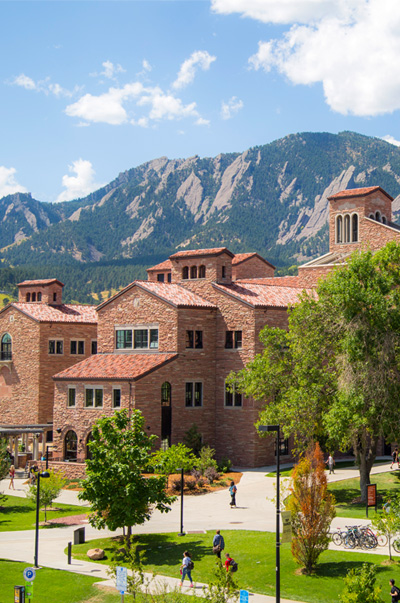
Goals
The Lotsawa Translation Workshop was designed to provide an opportunity for translators and scholars at various stages in their careers to work together in a hands-on workshop setting on translations-in-progress. The goals of the Lotsawa Translation Workshop are:
- to connect theory and practice in crafting literary translations of Buddhist literature from Tibetan into English;
- to forge a community of practice around translation through experimentation, dialogue, and feedback;
- to make short Buddhist works of Tibetan literature available to practitioners, undergraduates, and the general public through publishing thematic anthologies of translations.

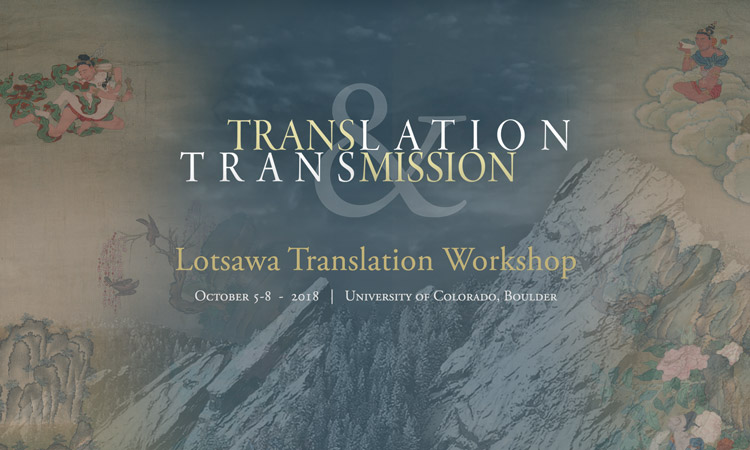
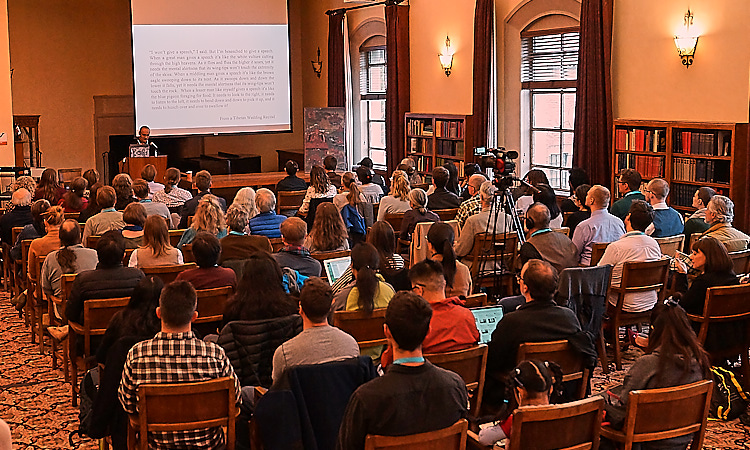

2018 Lotsawa Translation Workshop
Friday, October 5, 2018
WELCOME DAY
5:30 PM Opening Remarks with Holly Gayley and Marcus Perman
5:30 PM Evening Event with Janet Gyatso and Kurtis Schaeffer
Saturday, October 6, 2018
DAY ONE
9:00 AM Keynote Lecture: An Act of Bardo: Translating Tibetan Poetry
11:00 AM Breakout Sessions
- Criteria for Beauty and Readability
- Uncontrived Elegance in Tibetan Songs
- Vocabularies of Longing
2:00 PM Workshop Sessions
Sunday, October 7, 2018
DAY TWO
9:00 AM Plenary Panel 1: Dynamics of Devotion
11:00 AM Breakout Sessions
- Collections of Songs (mgur ‘bum)
- Gender in Translating Devotional Verse
- Linguistic Hospitality
- Rasa Theory and Affect
2:00 PM Workshop Sessions
Monday, October 8, 2018
DAY THREE
9:00 AM Plenary Panel 2: Reflections on the Translation Process
11:00 AM Breakout Sessions
- Balancing Form and Content
- Devotion to the Guru, Loyalty to the Nation
- Ornamentation Shared by Poetry and Song
- Textuality and Materiality
12:30 PM Closing Remarks with Dominique Townsend, Holly Gayley, Janet Gyatso, Kurtis Schaeffer, and Lama Jabb
Speakers and Facilitators
Search speakers details
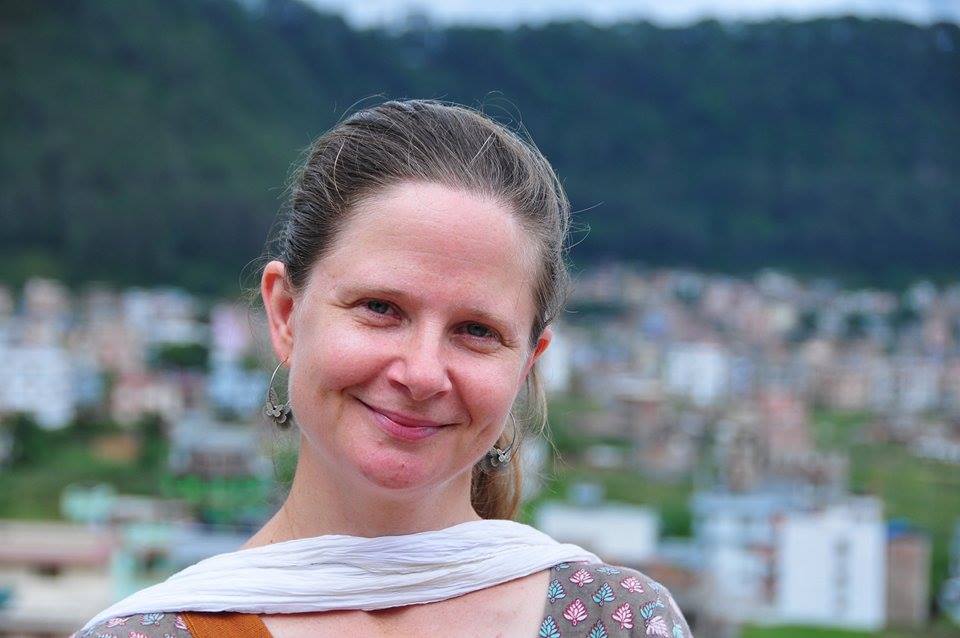
Lara Braistein
McGill University
Lara Braitstein is Associate Professor of Indian and Tibetan Buddhism at McGill University. She has also taught at the Karmapa International Buddhist Institute (K.I.B.I.) in New Delhi, and the Rangjung Yeshe Institute in Kathmandu. She teaches Mahayana & Vajrayana Buddhist Philosophy, Buddhist Hagiography, and Tibetan/Himalayan Buddhist literature and historiography. She translated the 14th Shamarpa’s The Path to Awakening, and is the author of The Adamantine Songs: Study, Translation, and Tibetan Critical Edition, a study of Saraha’s Mahamudra poems. Her recent research is a study dedicated to untangling the history and representation of the 10th Shamarpa Chodrup Gyatso.
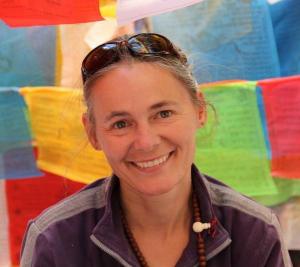
Heidi Nevin
Independent
Heidi Nevin studied Tibetan language at Manjushri Center for Tibetan Culture (1996-8); apprenticed to Kyabje Chatral Rinpoche (1996-2003); served Lama Tharchin by helping to translate the mkha’ ‘gro thugs thig (Vol. Ma of Dudjom Rinpoche’s Collected Works) and other texts (2006-present). She translated the autobiography of Khenpo Ngakchung (Wondrous Dance of Illusion, Shambhala, 2013, restricted text) and is currently translating volume one of Dungse Trinley Norbu Rinpoche’s three-volume Collected Works. Heidi lives in Corvallis, Oregon, USA.
Holly Gayley
University of Colorado, Boulder
Holly Gayley is Assistant Professor of Buddhist Studies at the University of Colorado, Boulder. Her research focuses on the revitalization of Buddhism in the Tibetan region of Golok since the 1980s. She completed her Masters in Buddhist Studies at Naropa University in 2000 and PhD at Harvard University in Tibetan and Himalayan Studies in 2009. Currently, she is finalizing a manuscript on the life and love letters of the contemporary female tertön, Khandro Tāre Lhamo, and her consort Namtrul Rinpoche and translating texts of advice to the laity by Khenpo Jigme Phuntsok and his successors at Larung Buddhist Academy in Serta. In 2013, Holly co-organized the conference, “Translating Buddhist Luminaries,” which brought translators and scholars into a conversation about the art of translation in relation to pithy texts of advice by nineteenth century ecumenical masters such as Patrul Rinpoche, Ju Mipham, and Jamgön Kongtrul. The translations will appear in an edited volume with Wisdom Publications.
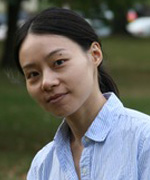
Jue Liang
University of Virginia
Jue Liang is a PhD candidate at the Department of Religious Studies, University of Virginia. She is currently writing her dissertation, titled Conceiving the Mother of Tibet: The Life, Lives, and Afterlife of Ye shes mtsho rgyal. This dissertation explores the formation of a literary tradition surrounding Ye shes mtsho rgyal in the fourteenth and fifteenth centuries and proposes an understanding of this tradition as growing out of and reflecting the theological concerns of the Rnying ma Buddhist communities at the time. Jue’s research interests include gender and sexuality in Buddhism, the hagiographical tradition in Tibetan Buddhism, Tibetan historiography and literature, female Buddhist masters and practitioners, and Treasure (gter ma) literature. Jue holds a BA in Chinese Literature and an MA in History from Renmin University of China, and an MA in History of Religions from the University of Chicago.
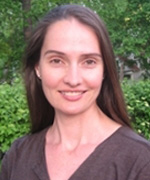
Sarah Jacoby
Northwestern University
Sarah Jacoby, Ph.D., is an associate professor in the Religious Studies Department at Northwestern University. She is also the co-chair of the Tibetan and Himalayan Religions Group at the American Academy of Religion. Sarah Jacoby studies Tibetan Buddhist doctrine and ritual in practice, gender and sexuality, Tibetan literature, religious auto/biography, Buddhist revelation (gter ma), and the history of eastern Tibet. She is the author of Love and Liberation: Autobiographical Writings of the Tibetan Buddhist Visionary Sera Khandro (Columbia University Press, 2014), co-author of Buddhism: Introducing the Buddhist Experience (Oxford University Press, 2014), and co-editor of Buddhism Beyond the Monastery: Tantric Practices and their Performers in Tibet and the Himalayas (Brill, 2009).

Dominique Townsend
Bard College, NY
Dominique Townsend is Assistant Professor of Buddhist Studies at Bard College. She received her BA from Barnard College, MTS from Harvard Divinity School and PhD from Columbia University in the Department of East Asian Languages and Cultures. Her research is stimulated by productive tensions in Buddhist cultures, such as the relationship between the cultivation of the arts and renunciation. Dominique’s primary interests include Buddhist poetics, pedagogy, and institutionalized charisma. Her current project, based on her dissertation research, focuses on aesthetics and cosmopolitanism in Tibetan Buddhism, with a particular focus on the history of Mindrölling Monastery.
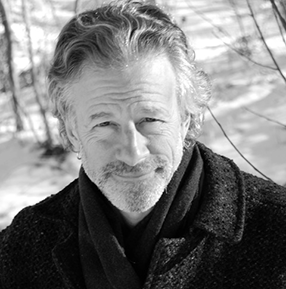
Andrew Schelling
Naropa University
Andrew Schelling is a North American poet, translator, and editor. He has published seven books of classical Sanskrit, Prakrit, and vernacular poetry in translation. Dropping the Bow: Poems from Ancient India, received the 1992 Academy of American Poets award for translation, the first time the preeminent institute for poetry in America recognized work from an Asian language. His latest book, Tracks Along the Left Coast: Jaime de Angulo and Pacific Coast Culture, is a folkloric account of California linguistics. A collection of old India’s poet Bhartrihari will be released by Shambhala Publications in Fall 2018. He teaches poetry and Sanskrit at Naropa University in Boulder, Colorado.
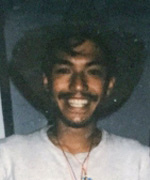
Riga Shakya
Columbia University
Riga Shakya is a PhD candidate in Sino-Tibetan history in the History-East Asia Program at Columbia University. His interests broadly span classical and contemporary Tibetan literature and the history of Sino-Tibetan relations. Riga’s doctoral research centres on the emergence of Tibetan political biography during the Qing period, with particular attention to the literary works of the Tibetan cabinet minister and polymath Dokhar Tsering Wangyal (Mdo mkhar tshe ring dbang rgyal). He is currently working on the first English language translation of Dokhar’s autobiography Reflections of a Cabinet Minister (Bka’ blon rtogs brjod). Riga holds a BA in East Asian Studies and Religious Studies from the University of Toronto, and a certificate in Tibetan Language and Culture from Tibet University, Lhasa. He is also an avid translator of contemporary Tibetan fiction and poetry.
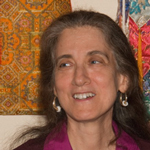
Anne Klein
Rice University
Anne Carolyn Klein/Rigzin Drolma, Professor and Former Chair of Religious Studies, Rice University, and Founding Director of Dawn Mountain, (www.dawnmountain.org). Her six books include Heart Essence of the Vast Expanse: A Story of Transmission; Meeting the Great Bliss Queen, Knowledge & Liberation, and Paths to the Middle as well as Unbounded Wholeness with Geshe Tenzin Wangyal Rinpoche. She has also been a consulting scholar in several Mind and Life programs. Her central thematic interest is the interaction between head and heart as illustrated across a spectrum of Buddhist descriptions of the many varieties of human consciousness.
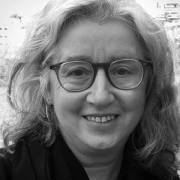
Janet Gyatso
Harvard University
Janet Gyatso (BA, MA, PhD, University of California at Berkeley) is a specialist in Buddhist studies with concentration on Tibetan and South Asian cultural and intellectual history. Her books include Apparitions of the Self: The Secret Autobiographies of a Tibetan Visionary; In the Mirror of Memory: Reflections on Mindfulness and Remembrance in Indian and Tibetan Buddhism; and Women of Tibet. She has recently completed a new book, Being Human in a Buddhist World: An Intellectual History of Medicine in Early Modern Tibet, which focuses upon alternative early modernities and the conjunctions and disjunctions between religious and scientific epistemologies in Tibetan medicine in the sixteenth–eighteenth centuries.

Natasha Mickles
Texas State University
Natasha L. Mikles is a lecturer in Tibetan and Chinese Religions at Texas State University and the current Secretary-General of the International Seminar of Young Tibetologists. Her research examines the intersection of Buddhist hell literature and the Gesar epic, especially as it relates to the late 19th-century promotion of Dzogchen practices among Nyingma monasteries in Khams. Her articles include “Buddhicizing the Warrior-King Gesar in the dMyal gling rDzogs pa Chen po”(Revue d’Etudes Tibétaines 2016) and “Tracking the Tulpa?: Exploring the ‘Tibetan Origins of a Contemporary Paranormal Idea” (NovaReligio 2015). Prior to her appointment at Texas State, Natasha was completing her doctoral degree at the University of Virginia (2017), for which she received the Charlotte W. Newcombe Dissertation Fellowship.

Andrew Quintman
Yale University
Quintman is associate professor in the Department of Religious Studies at Yale University, specializing in the Buddhist traditions of Tibet and the Himalaya. For seven years he served as the academic director of the School for International Training’s Tibetan Studies program based in Kathmandu. He is the author of The Yogin and the Madman: Reading the Biographical Corpus of the Great Tibetan Saint Milarepa (Columbia University Press 2014). His English translation of The Life of Milarepa (2010) was published in the Penguin Classics series. He is currently writing a history of Drakar Taso Monastery in Tibet southern borderland and a study of the Buddha’s life story through the visual and literary materials of Jonang Monastery in western Tibet.
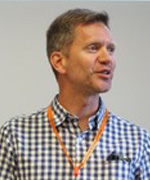
Jann Ronis
Buddhist Digital Resource Center
Jann Ronis is a scholar of Tibetan Buddhism and completed his PhD at the University of Virginia in 2009. His dissertation was about the history of a large monastery and Buddhist academy in eastern Tibet, located on one of the major trading routes linking Tibet to China. More recently his research has explored contemporary Tibetan literature. After completing his PhD he held postdocs in Paris and UC Berkeley. He taught at the latter for 7 years until becoming the executive director of the Buddhist Digital Resource Center in 2018.

Amelia Hall
Naropa University
Amelia Hall became a student of Thinley Norbu Rinpoche and Lama Tharchin Rinpoche in 2001. In 2005 she embarked upon a master’s degree in Tibetan and Himalayan Studies from the University of Oxford. She obtained her doctorate from Oxford in 2012, her dissertation, Revelations of a Modern Mystic: The Life and Legacy of Kun bzang bde chen gling pa 1928-2006, translates and reflects upon the biography of this Tibetan Buddhist visionary and the assimilation of Tibetan Buddhism in contemporary North America. She currently teaches courses on Buddhism and Tibetan language at Naropa University. In addition she directs research projects for the Naksang Foundation. Current projects focus on the translation and study of biographies, historical texts, and maps relating to the spread of Buddhism in the 17th Century CE from Tibet and Bhutan to Arunachal Pradesh. She is also an affiliated scholar at the Tibetan and Himalayan Studies Centre at Wolfson College, University of Oxford.
Kurtis Schaeffer
University of Virginia
Kurtis R. Schaeffer received an MA in Buddhist Studies from the University of Washington in 1995, a PhD in Tibetan and South Asian Religions from Harvard in 2000 and is now an associate professor of Tibetan and Buddhist Studies at the University of Virginia. His books include Sources of Tibetan Tradition (2013), The Tibetan History Reader (2013), The Culture of the Book in Tibet (2009), An Early Tibetan Catalogue of Buddhist Literature (2009), Dreaming the Great Brahmin (2005), and Himalayan Hermitess (2004).

Nicole Willock
Old Dominion University
Nicole Willock (PhD Indiana University in Tibetan Studies and Religious Studies, 2011) is an assistant professor at Old Dominion University in Norfolk, Va. She is 2017 Research Fellow, The Robert H. N. Ho Family Foundation Program in Buddhist Studies, administered by the American Council of Learned Societies for her book project: Lineages of the Literary: Tibetan Buddhists Making Modern China. She is currently polishing up A Tibetan-English Primer for Poetics (Snyan ngag leg deb bod yin shan sbyar), which is co-authored by Gendün Rabsal. She also co-translated “Zhangtön Tenpa Gyatso’s Advice a Jeweled Rosary” with Gendün Rabsal, which will appear in A Gathering of Brilliant Moons: Practice Advice from the Rimé Masters of Tibet, edited by Holly Gayley and Joshua Schapiro (Boston: Wisdom Publications, expected in 2017).
Stephen Gethin
Padmakara Translation Group; Tsadra Foundation Fellow
Stephen studied veterinary medicine at Cambridge University, where he was also awarded a choral exhibition, a position he was subsequently obliged to resign when his interest in Buddhism grew to the point where he had to choose between meditation classes and Sunday evensong. After a number of years in professional practice, during the 1980s he undertook two three-year retreats in France, where he now lives. He became a Tsadra Foundation Translation Fellow in 2005. His published translations include Nagarjuna’s Letter to a Friend, Zurchungpa’s Testament, A Torch Lighting the Way to Freedom, and Jamgön Mipham’s commentary on the Mahāyāna-sūtrālaṃkāra, A Feast of the Nectar of the Supreme Vehicle (2018). He is currently working on the sixteenth volume of the gdams ngag rin po che’i mdzod, and a detailed preliminary practice commentary by Shechen Gyaltsap.
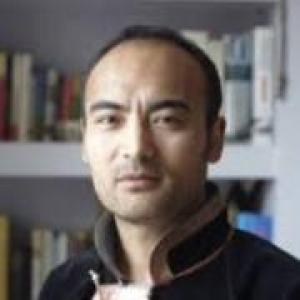
Lama Jabb
Wolfston College, Oxford
Lama Jabb was born and brought up in the Dhatsen tribe, a nomadic community from Northeastern Tibet. He completed his primary education in Tibet. Midway through the secondary education he left Tibet to attend a Tibetan refugee school in India. Since 1995 he has lived in United Kingdom. Lama Jabb received BA Honours degree in Political Science and MSc in International Relations from the School of Oriental and African Studies.

Annabella Pitkin
Lehigh University
Annabella Pitkin is Assistant Professor of Buddhism and East Asian Religions at Lehigh University. Her current research focuses on Tibetan Buddhist modernity, Buddhist ideals of renunciation, miracle narratives, and Buddhist biographies. She received her B.A. from Harvard and Ph.D. in Religion from Columbia, and has lived and traveled extensively in the Himalayan region, China, India, and Nepal. Her articles include “Dazzling Displays and Mysterious Departures: Bodhisattva Pedagogy as Performance in the Biographies of Two Twentieth Century Tibetan Buddhist Masters” (Religions, 2017); “The ‘Age of Faith’ and the ‘Age of Knowledge’: Secularism and Modern Tibetan Accounts of Yogic Power” (Himalaya, 2016), and “Lineage, Authority and Innovation: The Biography of Khunu Lama Tenzin Gyaltsen” (Mapping the Modern in Tibet, 2011). She is completing a book manuscript titled “Beggar Modern: Modernity, Renunciation, and Love in the Life of a 20th Century Tibetan Buddhist Saint.”
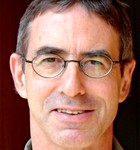
Jules Levinson
UMA Institute for Tibetan Studies
Jules B. Levinson graduated from Princeton University in 1975 and soon thereafter began studying at the University of Virginia under the guidance of Dr. Jeffrey Hopkins and the eminent Tibetan scholars invited by the University’s Center for South Asian Studies. He received a doctoral degree in Religious Studies from the University of Virginia in 1994. At present he lives and works in Boulder, Colorado.
Sarah Harding
Tsadra Foundation Fellow; Naropa University
Sarah Harding has been a Buddhist practitioner since 1974 and has been teaching and translating since completing a three-year retreat in 1980 under the guidance of Kyabje Kalu Rinpoche. Her publications include Creation and Completion, The Life and Revelations of Pema Lingpa, Treasury of Knowledge: Esoteric Instructions, Machig’s Complete Explanation, and Niguma, Lady of Illusion. She is an associate professor at Naropa University in Boulder, Colorado, where she has been teaching since 1992, and has been a fellow of the Tsadra Foundation since 2000. Currently she is working on translating the zhi byed and gcod sections of the gdams ngag rin po che’i mdzod.
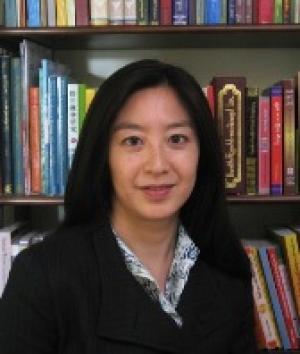
Nancy Lin
84000 and Berkeley
Nancy Lin is a visiting scholar at the University of California, Berkeley, specializing in Buddhist traditions of Tibet and the Himalaya. Her research focuses on courtly Buddhist culture, drawing from poetry and literature, images, objects, and other textual sources of the seventeenth and eighteenth centuries. Her current questions largely cluster around the dynamics between worldliness and renunciation as negotiated in such areas as religion and governance, social distinction and hierarchy, aesthetics and ethos, and wisdom and eloquence. Other interests include rebirth lineages and narratives, Tibetan engagement with Indic Buddhist and literary traditions, and cross-cultural interactions with the Qing court. She has previously held positions at UC Santa Cruz, Dartmouth College, and Vanderbilt University. Currently she is an associate editor for the 84000 translation initiative.
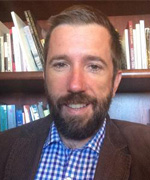
Lucas Carmichael
University of Colorado, Boulder
Lucas Carmichael received his Ph.D. in Religion and Literature from the University of Chicago, with a dissertation on English translations of the Daode jing. He is the co-founder and co-chair of the five-year “Transnational Religious Expression: Between Asia and North America” seminar at the American Academy of Religion. His research is stimulated by attention to translators as scribes and mediators of the cultural distances, hermeneutical negotiations, and historical connections between foreign texts and domestic readers. He focuses primarily on the translation, transmission, reception, and popularization of Chinese classics in Europe and America, and is currently preparing a book manuscript titled The Daode Jing as American Scripture.
John Canti
Padmakara Translation Group; 84000
In 1970, while studying medicine at Cambridge, John Canti first met his Buddhist teachers, and started to practice under their guidance. After hospital work in London and Cambridge, he moved in the late seventies to eastern Nepal to establish tuberculosis programs in two remote hill districts. Beginning in 1980, he underwent two three-year retreats in the Dordogne, France. Emerging from retreat at the end of the 80s, he helped found the Padmakara Translation Group, of which he is now president, and remains an active translator. From 2001 to 2014 he was a Fellow of the Tsadra Foundation. He is editorial director of 84000 and serves on the working committee as chair of the editorial section. He is based mainly in France but has spent long periods in Nepal and India. As well as his 84000 work, John is working on Mipham’s commentary on the Ratnagotravibhāgottaratantraśāstra.
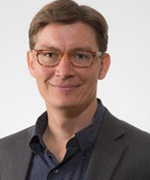
Ben Nourse
University of Denver
Ben Nourse is assistant professor of Buddhist Studies at the University of Denver, where he teaches an assortment of courses on Buddhism and Asian Religions, and a Senior Fellow with the Andrew W. Mellon Society of Fellows in Critical Bibliography at the Rare Book School. He received a BA in Asian Studies from the University of Wisconsin-Madison and a MA and PhD in Religious Studies from the University of Virginia. He is currently at work on a book-length study of the growth and impact of Tibetan woodblock publishing from the seventeenth through the nineteenth centuries. Most of his other projects are related to the history of Buddhist scriptures, including the history of the Tibetan Buddhist Canon (the Kangyur and Tengyur) and a study of the Dunhuang manuscripts of the Heart Sūtra in Chinese and Tibetan. He has been active in promoting the study of Tibetan book history through the hosting of conferences such as The Symposium on the Tibetan Book (University of Virginia, 2014) and Buddhist Book Cultures (University of Denver, 2017) as well as co-editing a forthcoming volume on material approaches to the study of Tibetan books. Ben has lived and conducted research in India, Nepal, and China, including as a Fulbright-Hays Fellow in China. He enjoys translating Tibetan literature and has been working for some time on a translation and study of Könchok Jikmé Wangpo’s (Dkon mchog ‘jigs med dbang po, 1728-1791) history of the kingdom of Choné (Co ne) found in his catalog to the Choné Tengyur.

